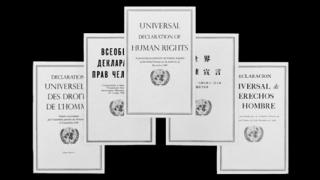
The 1948 Universal Declaration of Human Rights was the first document to affirm rights for all regardless of any distinction. Drafted by individuals from diverse political, cultural and religious backgrounds, it has been endorsed by all 193 UN member states.
But in rich and poor countries alike, many believe that the prevailing human rights regime is essentially Euro-American, reinforcing a worldview that pits the ‘West’ against the ‘rest’.
This attitude ignores the former’s deficiencies and the latter's contributions to the development of human rights norms. It also does not reflect developments in the past decade. The ‘war on terror’ polarised the rights debate and allowed unsavoury regimes across the world to use the language of counter-terrorism as a cloak.
The most powerful affirmation of rights, meanwhile, has come from ordinary people taking to the streets to claim their freedom and seek control over their own lives.
Against this backdrop, does it still make sense to talk about ‘universal’ human rights? Has the ‘West’ lost its edge? Did it have one in the first place?
Human rights expert panel
UNA-UK has put together an expert panel to debate these issues at UN Forum 2012:
- H.E. Kamalesh Sharma, Secretary-General of the Commonwealth (panel chair)
- Steve Crawshaw, Director of the Office of the Secretary-General, Amnesty International
- Dr Chaloka Beyani, UN Special Rapporteur on Internally Displaced Persons
- Tawakkol Karman, Yemeni human rights activist and Nobel Peace Laureate (tbc)
- Professor Francesca Klug OBE, Director, LSE Human Rights Futures Project (tbc)
- Afsane Bassir-Pour, Director, UN Regional Information Centre (tbc)
Take action
Please take action on three of UNA-UK's human rights priorities this year:
Creating a strong Arms Trade Treaty
This July, UN Member States will meet to discuss the creation of an Arms Trade Treaty. Organisations such as Oxfam, Amnesty International and UNA-UK have campaigned for over a decade for a robust treaty that ensures that weapons are not transferred to places where there is serious risk that they will be used to commit human rights abuses and atrocities.
Campaign for this life-saving treaty by signing the Control Arms petition
Stop the bloodshed in Syria
For more than a year now, the horrific effects of weapons being used on civilians have been painfully apparent in Syria. Some 10,000 people have been killed and brutal attacks continue. Last week, on 25 May, over 100 civilians - many of them children - were killed in the village of Houla. Whilst the UN Security Council has condemned the killings, it has so far not taken concerted action to stop the bloodshed. The support of Russia, one of the Council's permanent members, is key if action is to be taken.
Sign this Amnesty International petition to the Russian ambassador to the UN
End violence against women
Women all over the world - of all ages and from all walks of life - are affected by violence. According to the World Health Organization, women aged 15-44 are more likely to die as a result of physical or sexual violence than due to war, road accidents or cancer. In the UK, an estimated two women a week are killed in domestic violence incidents, and one in four will become the victims of sexual violence in their lifetimes. On International Women's Day this year, the UK Prime Minister made a commitment to tackle this issue, including by signing the Council of Europe’s Convention on Violence Against Women and Domestic Violence.
Take action to show your support
As always, you can also send us your thoughts on these issues and questions for our panel:
- Tweet: #UNForum2012
- Facebook: UNA-UK
- Email: website@una.org.uk
And make sure you book your UN Forum place as soon as possible!
Get inspired
- Learn more by reading our special rights issue of New World magazine
- Teach others about human rights by using our interactive teaching resource
- Watch this cute animation of the Universal Declaration of Human Rights






